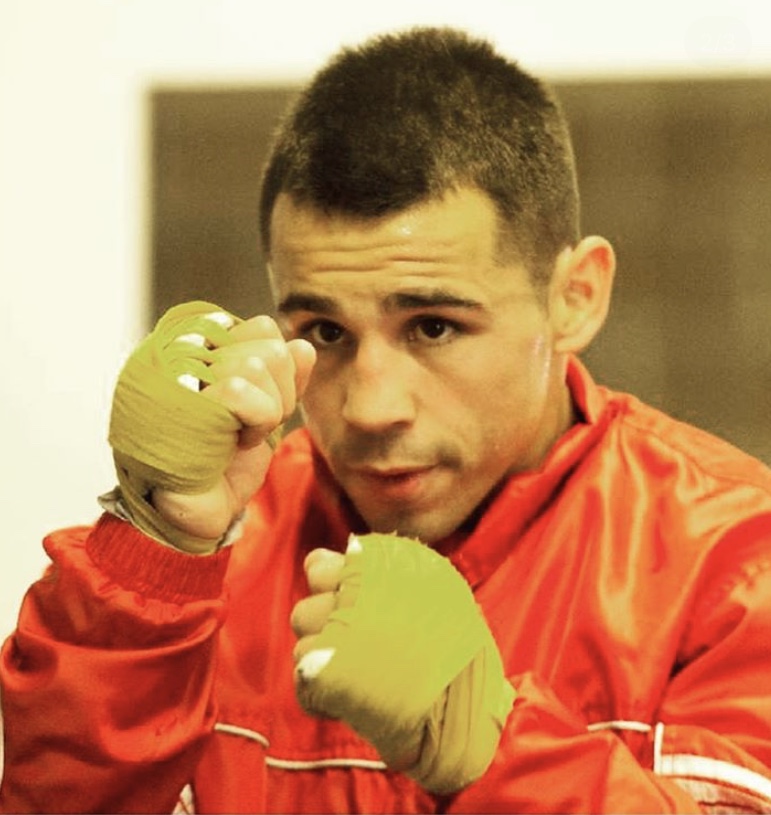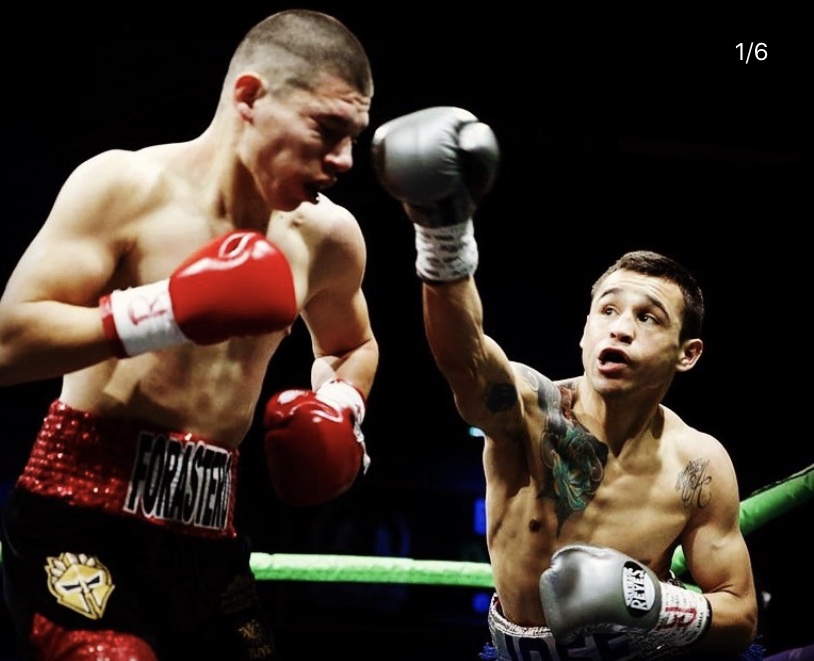It wasn’t supposed to be like this, was it?
Winners aren’t supposed to gather dust on the shelf, especially not after their first professional title was wrapped around their waist. Celebrations have never been so melancholy.
The nights aren’t supposed to be sleepless for champions, the pyjamas should be silk, and training for the next big fight should not leave the victor questioning his motivation. Unless that next big fight never comes and their phones are flipped over in almost-religious five-minute intervals, just in case they’ve missed that call.
Over three years have passed since Jose Haro (15-1-1, 8 KOs) toppled Daniel Franco in Iowa, lifting the USBA featherweight title and surprising most in attendance. The days and nights that followed have been plagued with pain and panic – for both men – after Franco suffered brain injuries following an eighth round knockout defeat.
Now, in the autumn of our strangest year, Haro is piecing together his boxing career with the love and support of Sheer Sports, one step at a time. He spoke to Boxing Social as America tiptoes gradually out of its Coronavirus pandemic and promised one last, impassioned roll of the dice.
“A lot of people were sending me death threats after the Franco fight saying, ‘You should die, how can you hurt somebody that bad?’ They were calling me names, but, obviously, these were probably [members of] his family or his fans or whatever. I had to swallow that,” said Haro, now 33-years old.
“Before I knew that he’d recover, every single day I was thinking, ‘What if this guy dies?’ So that was taking a real toll on me. I was like, ‘Oh, my God. What if this guy does actually die?’ I worried. I was like, ‘What am I going to do? I can’t do nothing about it, but I as a human, I’m going to feel horrible’.
“I don’t know how long he was in a coma for; I think it was for like a month or less. But once they told me that he was doing a lot better, it took this huge pressure off my back. I beat Franco. And then to find out the next day he was in a coma, it just felt like that took my victory away because all of the attention was on Franco because he was in a coma. But I get it. I’m just so glad he’s doing better now.”

That summer evening in 2017 wasn’t the beginning of Jose Haro’s story. It seemed, momentarily, as though it could be the end, but his return to boxing began in January this year, beating Genaro Velarde Rodriguez over six rounds.
The father of six (soon to be seven – though his plans for 10 have seemingly been squashed by his wife) has been fighting for over two decades, wandering into the gym with his tail between his legs, a classified petty criminal.
Boxing was viewed as both a punishment and preparation for a life bordered by consequence, and even Jose’s father couldn’t have imagined what would follow. Over 115 amateur bouts, with only 17 losses signalled natural ability and showcased his dedication, despite moving from town to town.
“When I was 12, I got caught shoplifting at a grocery store,” the Yakima, Washington born fighter confessed. “I was stealing some candy, some Reese’s Pieces, and they called my dad because I got caught stealing. My dad was super disappointed in me. Afterwards, he whooped my ass because – stealing? That’s not what we do in the Hispanic community. So my dad decided to sign me up and put me into boxing the very next day.
“I was nervous when I went to the gym because I knew that I was dealing with people that actually knew how to fight. I remember I was watching this kid hitting the bag and I thought he was knocking the air clean out of the bag. I thought he was hitting it that hard, but it was him breathing out. But growing up was kinda rough at times.
“Yakima, it’s just a small town. It’s over 100,000 people, but it’s super small so everybody knows everyone there. The only way to move up there, the only jobs they had to offer there were just like a warehouse job or a job at Walmart or something. The only way you can get promoted is if the manager there passes away or gets fired. That’s the only time you can move on, so your opportunities there are very limited.”
Haro would pursue a career in boxing, making his professional debut just over 10 years ago. It’s startling that his career has only moved at this steady, pedestrian pace.
He stopped five of his first, six paid opponents, but fought on local cards with less than a handful of contests. Haro didn’t know enough about boxing’s business end; he just slipped through the ropes and fought for his family and friends. With every victory, he clambered up the rankings, eventually squaring off with respected Rhode Islander, Toka Kahn Clary.
“So, I get this phone call to fight Kahn. It was like a week before the fight, so I get the call. I think I was 13, maybe 15 pounds over the weight limit, and I took the fight,” he said. “I just took it because I was desperate to fight. In reality, I was like, ‘You know what? I don’t want to lose, but I feel with the loss on my record, I might have a better chance of getting proper fights’.
“Obviously, mentally and physically, I wasn’t in shape to fight, but I just took it because I was like, ‘If I lose this fight, I feel like more opportunities are going to come my way’. Plus, our fourth child was on its way, and it was my baby boy. It was my son. Kahn beat me fair. I was upset because I don’t like to lose, but it just sucked.”
Haro, with his seventh child currently on the way, explained, “My main focus was that I’ve got to come home and make it to my son’s birth. So the next day when I get home, my son comes – that day. I was there for his birth. Win or lose, I’m proud of myself regardless because this sport, it’s a tough sport, and I feel like if you dwell on a loss or something like that, it’s going to eat you up alive, and I can’t have that.”

Jose went from fighting Toka Kahn Clary in 2014, to spending the next year with very little to celebrate. Disaster struck; this time far away from the skipping ropes and sweat that coats the floor of the boxing gym.
Haro, working his day job as a Sales Rep for Pepsi, was shot at six times by a drug addict, resulting in deep, career-threatening bullet wounds in either foot. This was before titles, before paydays and before Daniel Franco.
“They had to take bone off my knee to replace it in my foot because I was missing two inches of bone on my foot. Yeah, and then I was in a cast. I was in a wheelchair for like a month,” he recalled.
“That was right after the [Juan] Reyes fight [W8]. And oh, damn, I was at my best then. That’s when my confidence was grown. I was like, ‘Oh, my God. I think this is it’. I was telling my wife and my brother at the time, ‘I think my next fight’s going to be for some titles or something’. Then I ended up getting shot twice.”
It’s been setback after setback, but the fight continues. Why? It doesn’t seem as though Haro relies on the sport to provide for his ever-growing family, with a full-time job secured over 15 years ago. Boxing is his vice; it’s his illness and his addiction. But he’s not alone in that respect.
When speaking to Boxing Social, the strength of his marriage became a focal point. Jose’s wife is now close to completing her nursing degree – regularly delayed as he chased his own dreams, knocked back year after year – and he could not be prouder. It was her success that drove him. That and the innocent, hopeful look on his children’s faces as he prepared to go to war once again.
Life is bigger than boxing, but the sport still courses through his veins inexplicably.
“My wife gets mad at me sometimes,” he explained, exchanging a deep breath for a tiny burst of laughter. “Because in boxing, a lot of us don’t make that money like some of these fighters and so my wife gets kind of frustrated because she’s like, ‘You win every Friday. You going to get paid more? That’s all nonsense. It’s bullshit,’ she says, ‘You have not got a raise for the longest time’. I’m like, ‘I know, baby, but it’s right there’.
“She’s my biggest supporter. Don’t get me wrong. I’ve been able to do what I’m gonna do with boxing because of her, but she has seen my career go up and down, up and down, so sometimes she just feels overwhelmed. You know? She’s my number one supporter, that’s why I truly believe if it wasn’t for her, I wouldn’t be able to box, because she was a dental assistant for like 10 years. She always wanted to become a nurse. She always wanted to go into the medical field. She kept putting that on hold every year because of my boxing, and every year she kept delaying – for me.
“Boxing is just like life. I mean, it’s not fair, but whatever opportunities you get, you have to just take full advantage of them. And also, boxing is just like a job. It’s very political. There is a lot of fighters that deserve a title shot and deserve way more pay, but they never get those opportunities. There’s fighters that did not deserve a title shot, but they still get it. As long as I come home to my kids the same man that left them, I’m happy with that.”
Boxing is just like life – and it isn’t fair. Haro knows that better than most.
He spoke of keeping in contact with an improving, healthier Daniel Franco, the man who defined his professional career, whether he liked it or not. It wasn’t for selfish reasons, though. Haro truly cared.
His sleep has improved over the last two years, allowing him the chance to combine the 50-hour working week with a strict, disciplined boxing regime. The best night of his life dissolved before his very eyes, with his arm lifted in an empty celebration. But that was over now. Refreshed and buoyed by the love of a solid management team in Sheer Sports, with both feet healed to the best of their ability, Haro is ready to launch another assault on world titles.
His mooted bout with former Welsh world champion, Lee Selby, fell through. They didn’t want the negativity that accompanied his bout with ‘Twitch’. That wasn’t his fault, he remarked. But that didn’t matter in a sport famous for fickle fans and double standards.
It wasn’t supposed to be like this. Yet, here we are.
Haro continues fighting for his children, his wife and his fans. He continues working to pay the bills and to keep putting food on the table. Haro continues caring because it’s in his nature, beyond the bludgeoning of opponents and the despondency of defeat.
This is his last chance.